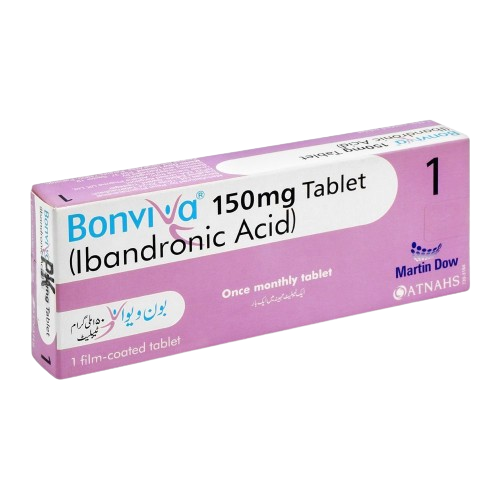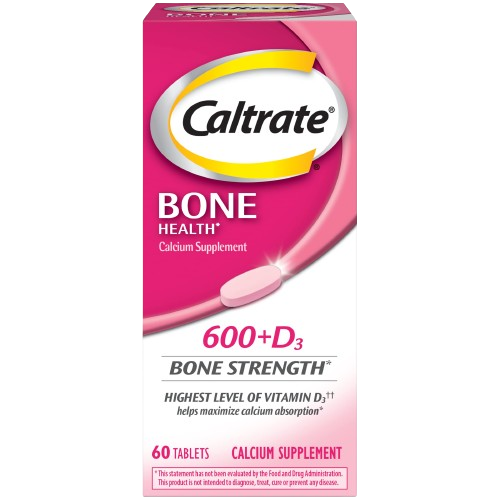Bonviva (ibandronic acid) 1’ct tablet Imported in Pakistan
Bonviva, containing ibandronic acid, is a medication primarily used for the treatment and prevention of osteoporosis in postmenopausal women. It is available in Pakistan as a 150 mg film-coated tablet, which is imported and requires a prescription for purchase.
Product Details
- Brand: Bonviva
- Active Ingredient: Ibandronic Acid (150 mg)
- Form: Film-coated tablet
- Dosage: One tablet per month, taken after an overnight fast and at least one hour before consuming any food or drink other than water.
Indications
Bonviva is indicated for:
- Treatment of osteoporosis in postmenopausal women to reduce the risk of vertebral fractures.
- Management of bone damage in conditions such as breast cancer and hypercalcemia due to tumors.
Original price was: ₨9,000.00.₨7,999.00Current price is: ₨7,999.00.
Description
Bonviva, containing ibandronic acid, is a medication primarily used for the treatment and prevention of osteoporosis in postmenopausal women. It is available in Pakistan as a 150 mg film-coated tablet, which is imported and requires a prescription for purchase.
Product Details
- Brand: Bonviva
- Active Ingredient: Ibandronic Acid (150 mg)
- Form: Film-coated tablet
- Dosage: One tablet per month, taken after an overnight fast and at least one hour before consuming any food or drink other than water.
Indications
Bonviva is indicated for:
- Treatment of osteoporosis in postmenopausal women to reduce the risk of vertebral fractures.
- Management of bone damage in conditions such as breast cancer and hypercalcemia due to tumors.
-
Key Benefits
- Prevention of Bone Loss: Bonviva is effective in preventing bone loss associated with osteoporosis, particularly in postmenopausal women, thereby reducing the risk of fractures.
- Increased Bone Mass: The medication helps to rebuild bone density, making bones less likely to break.
- Reduction in Fracture Risk: Clinical studies have demonstrated that Bonviva significantly lowers the risk of vertebral fractures, although its efficacy on hip fractures is not established.
- Convenient Dosing: Bonviva is administered as a monthly oral tablet, which can improve adherence compared to daily regimens.
- Support for Healthy Lifestyle: The effectiveness of Bonviva is enhanced when combined with a healthy lifestyle, including a balanced diet rich in calcium and vitamin D, regular weight-bearing exercise, and avoiding smoking and excessive alcohol consumption.
Key Ingredients
- Active Ingredient: Ibandronic acid (150 mg per tablet) is the primary active substance responsible for the medication’s effects on bone density and fracture prevention.
- Excipients: The formulation may include various inactive ingredients that aid in the tablet’s stability and absorption, although specific excipients are not detailed in the provided sources.
-
Interactions with Other Medications
- Antacids and Supplements: Bonviva can interact with antacids and supplements that contain calcium, aluminum, magnesium, or iron. These should be taken at least one hour after taking Bonviva to avoid reducing its effectiveness.
- Nonsteroidal Anti-Inflammatory Drugs (NSAIDs): While pain medications such as NSAIDs (e.g., ibuprofen, naproxen) can be used, they may increase the risk of gastrointestinal side effects like upset stomach when taken with Bonviva. It is advisable to consult a doctor before combining these medications.
- Calcium and Vitamin D Supplements: Patients may need to take calcium and vitamin D supplements while on Bonviva, but this should be discussed with a healthcare provider to ensure proper timing and dosage.
- Other Medications: Always inform your doctor about all medications, including over-the-counter drugs and herbal supplements, to avoid potential interactions. Bonviva should not be taken with food or drinks other than water, as this can also affect its absorption.
Recommendations
- Timing: After taking Bonviva, patients should wait at least one hour before taking any other medications or supplements. This helps ensure that Bonviva is absorbed effectively and reduces the risk of gastrointestinal irritation.
- Consult Healthcare Providers: Always consult with a healthcare provider before starting any new medication or supplement while on Bonviva to ensure safety and efficacy.
-
Medications to Avoid
- Calcium, Magnesium, Iron, and Aluminum Supplements: These can interfere with the absorption of Bonviva. It is recommended to wait at least one hour after taking Bonviva before consuming any of these supplements.
- Non-Steroidal Anti-Inflammatory Drugs (NSAIDs): Medications such as ibuprofen, naproxen, and diclofenac may increase the risk of gastrointestinal irritation when taken alongside Bonviva. Caution is advised if these painkillers are necessary.
- Antacids: Similar to calcium and magnesium supplements, antacids should not be taken within one hour of Bonviva as they can reduce its effectiveness.
- Aspirin: This can also irritate the stomach and intestines, and caution should be exercised when using it in conjunction with Bonviva.
General Recommendations
- Timing: After taking Bonviva, patients should wait at least one hour before taking any other medications, including vitamins and supplements, to ensure optimal absorption.
- Consultation: Always inform your healthcare provider about all medications, including over-the-counter drugs and supplements, to manage potential interactions effectively.
-
Dietary Restrictions
- Fasting Requirement: Patients should fast for at least 6 hours before taking Bonviva and continue fasting for 1 hour after ingestion. This helps maximize the absorption of the medication.
- Water Only: Bonviva should be taken with a full glass of plain water (180 to 240 ml). Other beverages, including fruit juices and those containing calcium, should be avoided as they can interfere with the absorption of ibandronic acid.
- Avoid High-Calcium Water: If there is concern about high calcium levels in tap water (hard water), it is advised to use bottled water with low mineral content.
- Calcium and Mineral Supplements: Supplements containing calcium, magnesium, iron, or aluminum should not be taken within one hour before or after taking Bonviva, as they can significantly reduce its effectiveness.
- Dietary Calcium and Vitamin D: While patients should avoid calcium-rich foods and supplements around the time of taking Bonviva, maintaining an adequate intake of calcium and vitamin D is essential for overall bone health. Patients are encouraged to ensure they receive these nutrients at other times throughout the day
Foods and Beverages to Avoid
- Calcium-Rich Foods: Foods high in calcium, such as dairy products (milk, cheese, yogurt), leafy greens (kale, broccoli), and fortified foods, should be avoided around the time of taking Bonviva. These can interfere with the absorption of the medication.
- Iron and Magnesium-Rich Foods: Similar to calcium, foods rich in iron (red meat, beans, lentils) and magnesium (nuts, seeds, whole grains) should not be consumed within one hour before or after taking Bonviva, as they can also affect its efficacy.
- High-Aluminum Foods: Foods that contain high levels of aluminum, such as certain processed foods and antacids, should be avoided for the same reason.
- Acidic Foods and Drinks: Citrus fruits and juices (like orange juice) should be avoided because they can irritate the gastrointestinal tract, which may be sensitive when taking Bonviva.
- Alcohol: It is advisable to limit or avoid alcohol consumption, as it can exacerbate gastrointestinal side effects and may interfere with bone health.
General Recommendations
- Timing: Bonviva should be taken with a full glass of plain water first thing in the morning, on an empty stomach. After taking it, patients should wait at least one hour before consuming any food, drink (other than water), or other medications.
- Upright Position: Patients should remain upright for at least one hour after taking Bonviva to minimize the risk of esophageal irritation.
-
Mechanism of Action
- Inhibition of Osteoclast Activity: Ibandronic acid specifically inhibits osteoclasts, the cells responsible for bone resorption. By blocking these cells, Bonviva reduces the breakdown of bone tissue, leading to decreased bone loss.
- Reduction of Bone Turnover: The inhibition of osteoclasts results in a reduction in bone turnover markers, which indicates a decrease in the rate of bone loss. This is crucial for maintaining or increasing bone density over time.
- Increased Bone Density: By reducing the activity of osteoclasts, Bonviva helps to preserve bone mass and density. Clinical studies have shown that treatment with Bonviva leads to significant increases in bone mineral density (BMD) in the spine and hip, which are critical areas prone to fractures in individuals with osteoporosis.
- Fracture Risk Reduction: The ultimate goal of Bonviva’s action is to lower the risk of fractures. Studies have demonstrated that Bonviva effectively reduces the incidence of vertebral fractures in women with osteoporosis, although its effect on hip fractures has not been conclusively established.

Chemical Structure
- IUPAC Name: {1-hydroxy-3-[methyl(pentyl)amino]-1-phosphonopropyl}phosphonic acid
- Molecular Formula: C₉H₂₃N₁O₇P₂
- Molecular Weight: 319.23 g/mol
- CAS Number: 114084-78-5
Structural Representation
The structure can be represented using the following formats:
- SMILES:
CCCCC(N(C)CCC(O)(P(O)(O)=O)P(O)(O)=O) - InChI Key:
MPBVHIBUJCELCL-UHFFFAOYSA-N
Structure Diagram
Ibandronic Acid Structure When taking Bonviva (ibandronic acid), there are several key precautions to follow to ensure the medication is taken safely and effectively:
Fasting and Timing
- Take Bonviva first thing in the morning, at least 6 hours after the last food or drink (other than water).
- Do not take Bonviva at bedtime or before getting up for the day.
- After taking Bonviva, wait at least 60 minutes before eating, drinking anything other than water, or taking any other medications.
Upright Position
- Take Bonviva while in an upright position (standing or sitting) with a full glass of plain water (180-240 ml).
- Do not lie down for at least 60 minutes after taking Bonviva to allow it to reach the stomach.
Avoid Certain Medications and Supplements
- Do not take Bonviva with calcium, magnesium, iron, or aluminum supplements, as they can interfere with absorption.
- Avoid taking antacids, aspirin, and NSAIDs (e.g., ibuprofen) around the time of Bonviva, as they may increase the risk of gastrointestinal side effects.
Dental Precautions
- Inform your dentist that you are taking Bonviva.
- Contact your doctor and dentist immediately if you experience any problems with your mouth or teeth, such as loose teeth, pain, swelling, or non-healing sores, as these could be signs of osteonecrosis of the jaw.
Renal Impairment
- Bonviva should be used with caution in patients with severe renal impairment (creatinine clearance less than 30 mL/min).
- Obtain serum creatinine prior to each injection and monitor renal function as clinically appropriate.
Pregnancy
- Contraindication: Bonviva should not be taken by pregnant women. There are no adequate data on the safety of ibandronic acid in pregnant women, and studies in animals have shown reproductive toxicity. The potential risks for humans remain unknown, making it essential to avoid this medication during pregnancy.
Breastfeeding
- Lactation: Bonviva should not be used during breastfeeding. It is not known whether ibandronic acid is excreted in human milk. However, studies in lactating rats have indicated that low levels of ibandronic acid can be present in milk following intravenous administration. Therefore, breastfeeding should be discontinued if Bonviva is necessary.
Dosage
- Recommended Dose: The standard dosage of Bonviva is one 150 mg film-coated tablet taken once a month. It is advisable to take the tablet on the same day each month for consistency.
- Administration Instructions:
- Take Bonviva on an empty stomach, at least 6 hours after the last meal or drink (other than water).
- Consume the tablet with a full glass of plain water (180-240 ml) while sitting or standing upright.
- Do not chew, crush, or dissolve the tablet in the mouth to avoid the risk of oropharyngeal ulcers.
- Remain upright for at least 60 minutes after taking the medication to reduce the risk of esophageal irritation.
- Missed Dose: If a dose is missed, take it the next morning unless the next scheduled dose is within 7 days. In that case, skip the missed dose and return to the regular monthly schedule. Do not take two tablets within the same week.
Storage
- Storage Conditions: Bonviva should be stored at room temperature, away from moisture and heat. Keep it in its original packaging to protect it from light and humidity. Ensure that the medication is kept out of reach of children.
Reviews
- Efficacy: Clinical studies have shown that Bonviva effectively increases bone mineral density (BMD) and reduces the risk of vertebral fractures in postmenopausal women. In one study, a significant percentage of patients demonstrated a decrease in bone turnover markers, indicating the drug’s effectiveness in managing osteoporosis.
- Side Effects: Common side effects include gastrointestinal issues such as dyspepsia, abdominal pain, nausea, and diarrhea. Some patients may also experience musculoskeletal pain or flu-like symptoms. Serious side effects, though rare, can include osteonecrosis of the jaw and hypersensitivity reactions.
- Patient Feedback: Reviews from patients generally indicate that while Bonviva is effective in managing osteoporosis, some users report gastrointestinal discomfort. It is important for patients to discuss any side effects with their healthcare provider to manage them appropriately.








Reviews
There are no reviews yet.